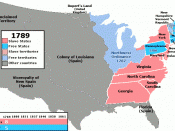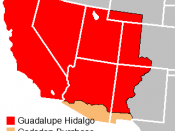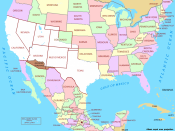In the year 1803, the Louisiana Purchase led to American unity until 1819. However the American Westward Expansion era was a time of uncertainty and chaos. During the years 1800-1850 this vision of unity was lost and disunity set in.
Many events impacted westward expansion, one of which was the Missouri Compromise. In 1818, Missouri petitioned Congress for permission to enter the Union as a slave state. The major problem was it would upset the balance of the equal 11 to 11 free and slave states. In 1819, New York Representative James Tallmadge proposed an amendment to ban slavery in Missouri even though there were numerous slaves living there. However, this amendment was passed in the House of Representatives but not the Senate. The bitterness of the debates reinforced the sectional division of the United States. In 1820, a bill was passed by the House to let Maine enter the Union as a free state.
By pairing the Missouri (slave) and Maine (free) the balance of free to slave states would be balanced. A measure was taken to prohibit slavery in the remainder of the Louisiana Purchase north of 36 deg 30' parallel. After that bump in the road, the U.S. was free from slavery issues until the war with Mexico in 1846. While the immediate cause of the war was the U.S. annexation of Texas, there were other factors. Another major factor was President Polk wanting to acquire California. United States government offered to pay off the Mexican debt to American settlers if Mexico allowed the U.S. to purchase the Mexican territories of California and New Mexico, which some Mexicans found offensive. When Mexico shut down our agreement, the United States prepared to take it by force. The U.S. took an easy victory and the war ended with the treaty of Guadalupe Hidalgo. Mexico surrendered a vast tract of land to the United States for a sum of $15 million. The Wilmot Proviso was another way of westward expansion by successfully breaking the gag rule. Polk suggested that we just continue the 36ð30' parallel while Calhoun said that they had no right to ban slavery from federal land. The proviso pushed the country closer to civil war and raised questions about slaves which had not been asked previously. The Compromise of 1850 was a series of actions whose purpose was the settlement of five questions in disputes between the pro-slavery and anti-slavery. The two parts that are associated with westward expansion are that California is to enter as a free state organized without restrictions to slavery and the Wilmot Proviso being rejected.


